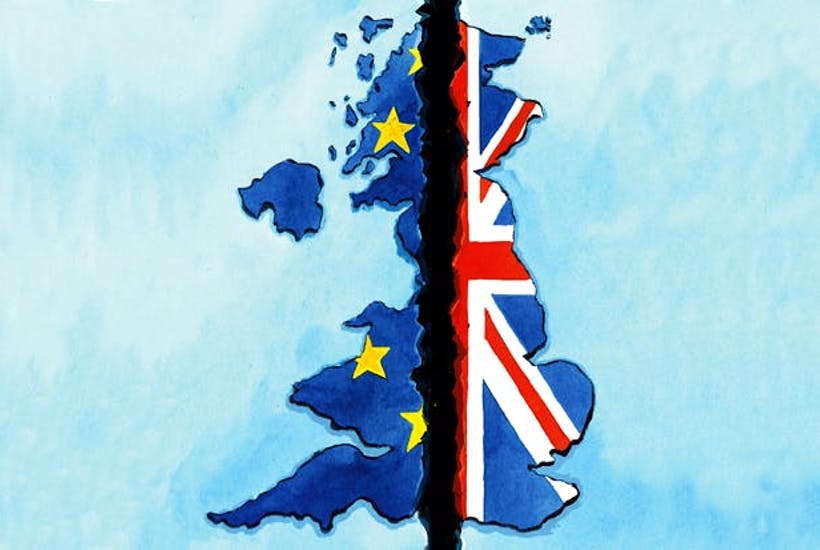Sometimes it’s worth addressing what didn’t happen. For one exasperating aspect of appearing on television news is leaving the studio kicking yourself for what you failed to say. Heading home from Broadcasting House, I’ll often impotently mutter all those killer arguments that fled my head when they might have counted for something. Yet during my last panel on Newsnight, the trouble wasn’t the usual deer-in-the-headlights stupor, but the fact that the lovely Emily Maitlis wouldn’t let me in. So let’s run back the tape.
Alastair Campbell is allowed a long riff on (surprise) Brexit. According to him, ‘Brexit’ means all things to all people. It is a ‘fantasy’ a-leap with ‘unicorns’, an elusive chimera that even its advocates cannot pin down. Whenever these delusional crackpots employ the word, they all mean something different.
Emily, Emily, pick me! If only I’d learned to be a better bully, I’d never have let him get away with it. I should have impolitely pounced: ‘Rubbish, Alastair, there’s nothing unfathomable about “Brexit”. It means economic and political independence. It’s called being a “country”, capisce? I come from a “country”, which in the States we never confuse with a mythological horned horse.’
See, throughout this three-year circus, a favorite Europhilic weapon of choice has been sheer bafflement. As Theresa May repeatedly returned to Brussels for revisions to the Withdrawal Agreement, Michel Barnier kept insisting that he didn’t understand what she wanted, although Parliament’s instruction was clear as day: an exit mechanism or an end-date for the backstop. I’m sorry, madame, but I cannot understand. AN EXIT MECHANISM OR AN END-DATE FOR THE BACKSTOP! I’m sorry, but… May might have been speaking to Siri in a heavy Welsh accent. Bafflement is a sly cover for intransigence.
For this crazy week, let’s conjure what else didn’t happen: 2016’s referendum tipping 52 percent for Remain. Thus the majority of Britons are content to quietly get on with continued membership of the EU. Yet freakishly, after the 2017 snap general election, and in defiance of both main parties’ pro-EU manifestos, three-quarters of MPs are Leave supporters. Though the matter should have been settled, this majority of parliamentarians continually push legislation aimed at dragging the UK out of the EU, in defiance of the people’s will. As the end of March 2019 approaches, to the media’s horror, the Commons seems poised to unilaterally withdraw Britain from the bloc. I cannot imagine the pandemonium on Newsnight (much less Channel 4 News). No hyperbole would seem sufficiently extreme. Emily’s guests would be throwing around words like ‘fascism’ and ‘coup d’état’. The New York Times would agonize about the hijacking of the cradle of liberal democracy, making comparisons to Orbán’s Hungary, or even Putin’s Russia.
So picture also an alarmingly large rabble of Leavers who narrowly lost in 2016 marching to Parliament Square. Their leaders claim the throng is a million strong — waving placards that vilify gullible Europhiles, demanding to hold the referendum again or insisting on a summary reverse of the ‘wrong’ result. How would the media describe this fuming, anti-democratic multitude paralyzing central London? Try ‘a mob of populist hoodlums and thugs’. Even absent any violence, the Met makes thousands of arrests. The UK seems to teeter on the edge of lawlessness, and from Cornwall to the Hebrides the British are quaking.
But Remainers didn’t win, did they?
I just came back from a book tour in Italy, where I’d no access to English-language TV news. So over my last breakfast, in Piacenza, my editor related the horrifying story dominating the Italian headlines. The day before, an ethnic Senegalese bus driver had kidnapped the 51 12-year-olds in his charge and poured petrol down the vehicle’s center aisle. He forced the three other adults to bind the kids’ wrists with zip ties. He confiscated everyone’s phones. Yet one student snatched a phone the driver missed. The child surreptitiously rang his mother, who contacted the police. When the cops corralled the bus, the driver rammed their cars. After carabinieri forced open the bus door and broke a back window to begin to release the children, the immigrant ignited the petrol. The bus went up in flames. The children managed narrowly to escape, as the bus cremated to a black shell. The driver claimed to be protesting against migrant deaths in the Mediterranean.
When later that day I return home to London, my husband mentions that he’s seen the story in the breaking news section of the New York Times website. So I go to my NYT app, and oddly find no mention of this extraordinary near massacre. I resort to the website: absolutely nothing on the paper’s long, extensive home page — where I note that the vandalizing of five Birmingham mosques (ugly, but at least life and limb were never at risk) enjoys pride of place up top. I go separately to the ‘world news’ section. I scan down about 20 articles. Nothing. But a button at the bottom says ‘more’. I hit that. Several more articles down I finally locate ‘Italian driver sets school bus on fire after kidnapping students’.
And get this! After two tiny, one-sentence paragraphs sketchily thumb-nailing the incident, the article spends all but one of the following six paragraphs detailing the terrible statistics for migrant deaths in the Med, effectively making the driver’s case for him. We only get the full lowdown on what happened beyond the article’s midway point. You get the gist: the New York Times didn’t like this story, didn’t find it politically convenient, and buried it the digital equivalent of six feet under.
Yet since we’re dwelling in the realm of the counterfactual this week, imagine the same news item with the roles reversed. A white, right-wing, native-Italian Salvini–supporter kidnaps 51 black immigrant children to protest against migration from North Africa, has the kids tied up, attempts to burn all the children alive, and very nearly succeeds. Now. Where does the Times put this story, and how hard is it to find?
This article was originally published in The Spectator magazine.


















